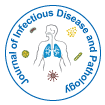Nosso grupo organiza mais de 3.000 Séries de conferências Eventos todos os anos nos EUA, Europa e outros países. Ásia com o apoio de mais 1.000 Sociedades e publica mais de 700 Acesso aberto Periódicos que contém mais de 50.000 personalidades eminentes, cientistas de renome como membros do conselho editorial.
Periódicos de acesso aberto ganhando mais leitores e citações
700 periódicos e 15 milhões de leitores Cada periódico está obtendo mais de 25.000 leitores
Indexado em
- Google Scholar
- RefSeek
- Universidade Hamdard
- EBSCO AZ
- ICMJE
Links Úteis
Diários de acesso aberto
Compartilhe esta página
Abstrato
Vector Control Interventions to Prevent Dengue: Current Situation and Strategies for Future Improvements to Management of Aedes in India
Amarjeet Singh and Andrew W Taylor-Robinson
Dengue is the most widespread vector-borne infectious disease of humans, existing in around 125 tropical and subtropical countries worldwide. The causative agent, a Flavirus, is transmitted from one person to another by female mosquitoes of the genus Aedes, primarily Ae. aegypti and Ae. albopictus, which breed in small, still bodies of freshwater such as storage tanks, buckets, plant pots and discarded household waste. Encouraging progress has been made in recent years towards the diagnosis and timely management of this debilitating and sometimes fatal disease. However, in the absence of an antiviral therapy or vaccine that is available and affordable in a low income setting, the means to combat dengue currently rely upon vector control measures that are directed against the immature aquatic stages, larvae and pupae, or adult mosquitoes. Although a number of different methods are in use, vector control has failed to prevent outbreaks from occurring and to avert an expansion of the geographical distribution of dengue. This is due to several limitations of present technologies that relate to dwindling financial resources, development of insecticide resistance, failure of long term sustainability and insufficient community involvement. In this context, there is a pressing need for an evidence-based selection process to determine how best to detect and exterminate the breeding of Aedes mosquitoes. This review considers existing vector control strategies as well as discussing some of the novel approaches that are in preparation, placing particular emphasis on relevance to the worsening public health issue of dengue endemicity in India.
Diários por Assunto
- Agro e Aquicultura
- Alimentação e Nutrição
- Bioquímica
- Ciência da Computação
- Ciência de materiais
- Ciencias ambientais
- Ciências Clínicas
- Ciências Farmacêuticas
- Ciências gerais
- Ciências Médicas
- Ciências Sociais e Políticas
- Ciências veterinarias
- Economia e Contabilidade
- Enfermagem e cuidados de saúde
- Engenharia
- Engenheiro químico
- Física
- Genética e Biologia Molecular
- Geologia e Ciências da Terra
- Gestão de negócios
- Imunologia e Microbiologia
- Informática
- Matemática
- Química
Revistas clínicas e médicas
- Anestesiologia
- Assistência médica
- Biologia molecular
- Cardiologia
- Cirurgia
- Dermatologia
- Diabetes e Endocrinologia
- Doenças infecciosas
- Enfermagem
- Fisioterapia e Reabilitação
- Gastroenterologia
- Genética
- Hematologia
- Imunologia
- Medicamento
- Medicina Reprodutiva
- Microbiologia
- Nefrologia
- Neurologia
- Odontologia
- Oftalmologia
- Oncologia
- Ortopedia
- Pediatria
- Pesquisa Clinica
- Pneumologia
- Psiquiatria
- Toxicologia

 English
English  Spanish
Spanish  Chinese
Chinese  Russian
Russian  German
German  French
French  Japanese
Japanese  Hindi
Hindi